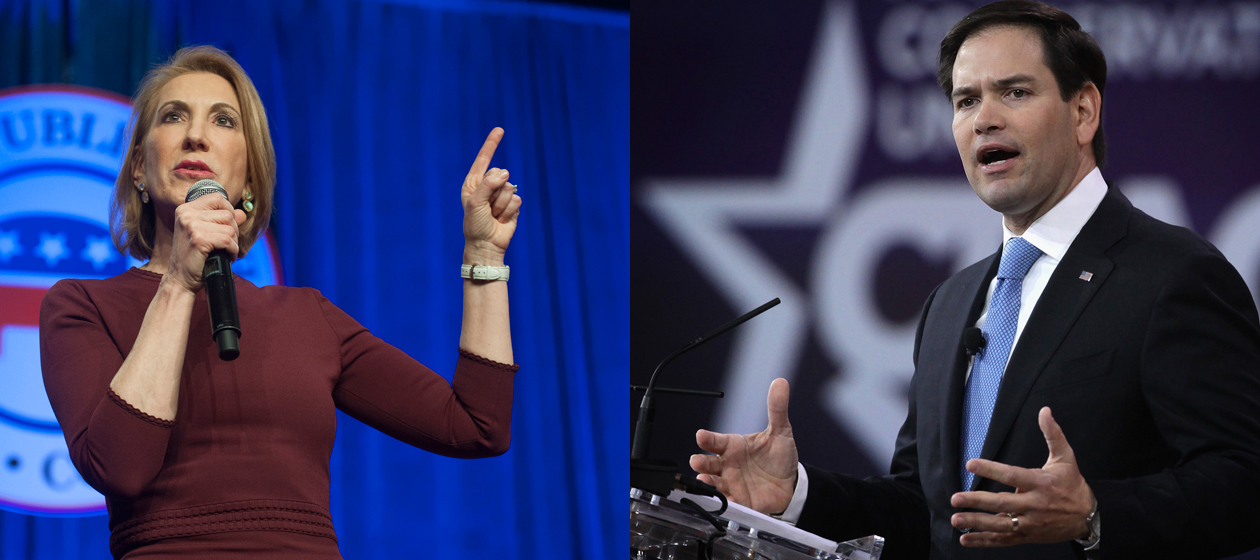The rise of Carly Fiorina and Marco Rubio
Their post-debate boomlet is real. It's also hollow... for now.


A free daily email with the biggest news stories of the day – and the best features from TheWeek.com
You are now subscribed
Your newsletter sign-up was successful
Last week's kick-off Republican primary debate has been praised as extremely entertaining. It's been praised for the seriousness of the questions asked by the Fox News moderators. It was the most-watched primary debate ever.
But it revealed nothing new.
Writers who I assume are not interested in the GOP except as theater were inclined to see Donald Trump as the man most elevated by the spectacle. Trump revealed himself as the perfect wrestling heel. Or he was the embodiment of a new media age that lacks the authority normally provided by mediating institutions. But the spectacle and the man at center stage lost momentum as the affair went on.
The Week
Escape your echo chamber. Get the facts behind the news, plus analysis from multiple perspectives.

Sign up for The Week's Free Newsletters
From our morning news briefing to a weekly Good News Newsletter, get the best of The Week delivered directly to your inbox.
From our morning news briefing to a weekly Good News Newsletter, get the best of The Week delivered directly to your inbox.
Those actually interested in the Republican primary as a vehicle for discovering the best candidate to represent their own claims on federal power correctly perceived Marco Rubio and Carly Fiorina as the two who did themselves the most good last Thursday. The pair now have an advantage they can exploit for a good long while.
However, their performance should not be any sort of revelation. Anyone watching the campaign (or the section of cyberspace where my columns appear) would have known already that Marco Rubio and Carly Fiorina are the best speakers of the whole lot of 17 candidates. Their speeches have always been among those most praised by the collective punditariat.
Many more casual viewers are just considering Fiorina and Rubio for the first time. They find that these two candidates are instantly likeable. Does that mean the other candidates will perceive Rubio and Fiorina as rivals and begin to attack? No, not yet.
Campaign consultants take as Gospel the notion that attacking another candidate at this stage is a suicide mission. No one wants to see a pretty face punched just after being introduced to it. To attack either of these candidates now would be like attacking a protagonist in the first act of a film; it would reveal the attacker as the villain in the story.
A free daily email with the biggest news stories of the day – and the best features from TheWeek.com
That's how you get John Kasich, the Republican candidate most admired by people not planning to vote Republican, trying to explain to Fox News' debate audience that Donald Trump and his supporters need to be understood, not dismissed and ridiculed. It was as if Kasich was reading his stage directions from a consultant. Don't give Trump's supporters a reason to hate you, the consultants whispered, and then he went out on stage and bleated, more or less, "I'm not going to attack Donald Trump or his supporters." The logic of that rhetorical strategy governs how all the candidates argue with the most polished presenters on stage.
The upside to attacking Rubio and Fiorina will only come later, when the audience and the media class agree that they are "for real," and that their success is directly correlated with another's failure. That's when the knives come out.
The longer more candidates stay in the race, and the longer it takes the media to figure out which candidate's success comes at the direct expense of another, the more time Rubio and Fiorina have to present themselves unobstructed. Until someone is declared their definite rival, their biggest enemy is the unforced error, a gaffe or an ethical scandal.
Now, simply being a great presenter is not the only ingredient for success. In 2008, Mike Huckabee took himself from an obscure governorship to a legitimate challenger and media figure. His electrifying speech at the 2007 Values Voters Summit prevented the leaders of that organization from uniting behind Mitt Romney. But he was eventually eclipsed by John McCain and Romney, neither of whom were then exceptional on the debate stage. He was also exposed to sustained attack in the conservative press for his deviations from party orthodoxy and scandals as governor.
Rubio and Fiorina have no such deviations. So here's my advice to all the traders on PaddyPower.com: Bet on a sustained rise for both of them until the field is winnowed down, or some bit of damaging opposition research is leaked to the press. They will face determined opposition eventually. But not yet.
As such, their victories in the debates are real. But in another way, they are also meaningless. Rubio's and Fiorina's momentum is nothing if it is not sustained with good fundraising, organization-building in Iowa and New Hampshire, and eventually solid advertising. On any stage in which they appear with more than five other candidates, they will look like top performers. The key now is what they do off the stage.
Michael Brendan Dougherty is senior correspondent at TheWeek.com. He is the founder and editor of The Slurve, a newsletter about baseball. His work has appeared in The New York Times Magazine, ESPN Magazine, Slate and The American Conservative.
